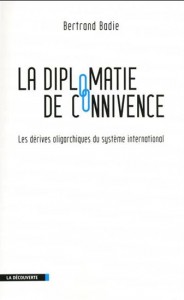Bertrand Badie (Sciences Po), La diplomatie de connivence
La Chute du Mur a laissé le système international sans nom : en le tenant pour « post-bipolaire », on parle de son passé , alors qu’on hésite entre l’idée d’ « unipolarité » , battue en brèche par l’impuissance américaine, et celle de « multipolarité » qui s’accorde mal à la faible attractivité des puissances moyennes…Derrières ces imprécisions, se dissimule une continuité profonde : l’entêtement oligarchique de la communauté des Etats, amorcée dès 1815 par une diplomatie de concerts qui n’a jamais disparue, même si elle a fait alterner moments de force et périodes d’infortune…On la retrouve aujourd’hui à travers le G8, puis le G20 qu’on nous présente médiatiquement comme les nouveaux directoires du monde, alors qu’ils collectionnent les blocages et renouvellent leur impuissance. Sa persistance révèle la manière dont la diplomatie de connivence est, depuis longtemps et sous des formes diverses, au centre du jeu international : limitée dans ses performances, défensive de ses privilèges, intermédiaire entre la compétition et la coopération, elle est surtout excluante dans ses pratiques. En soulevant des formes diverses de contestation, elle brouille le jeu international au lieu de l’ordonner. Phénix médiocre qui renait toujours de ses cendres, la diplomatie de connivence est examinée ici dans son histoire, ses fonctions, et ses échecs. Bonne manière d’explorer aussi la notion obscure de système international.
Discutant : Christian Lequesne (CERI)
CERI, salle de conférences, 17.00-19.00
